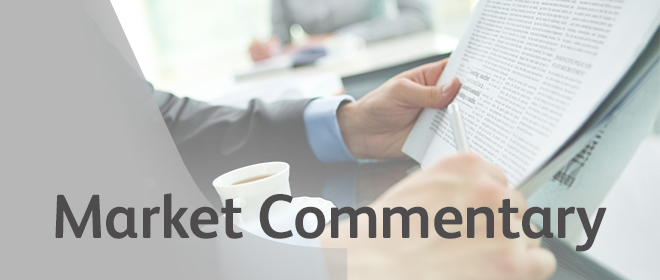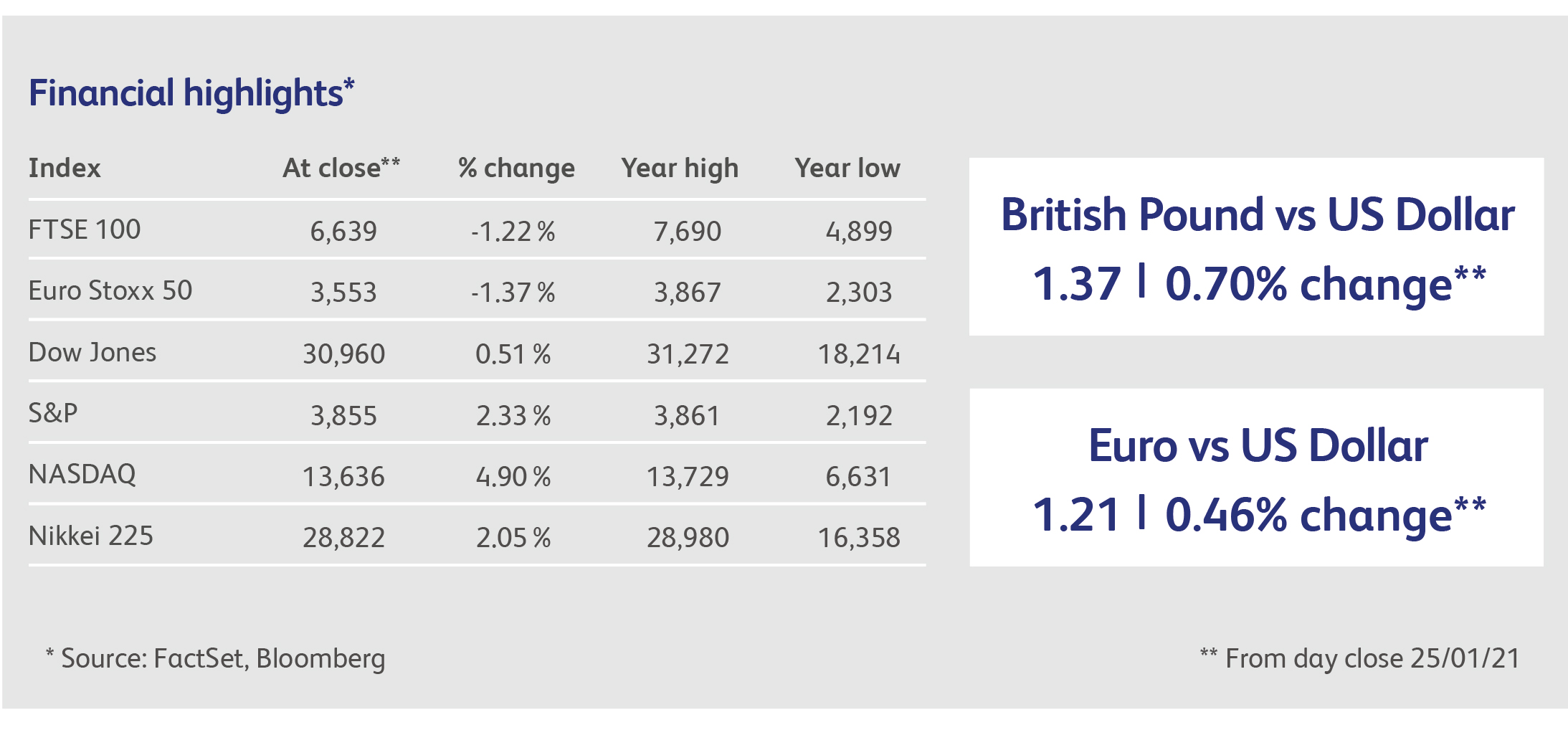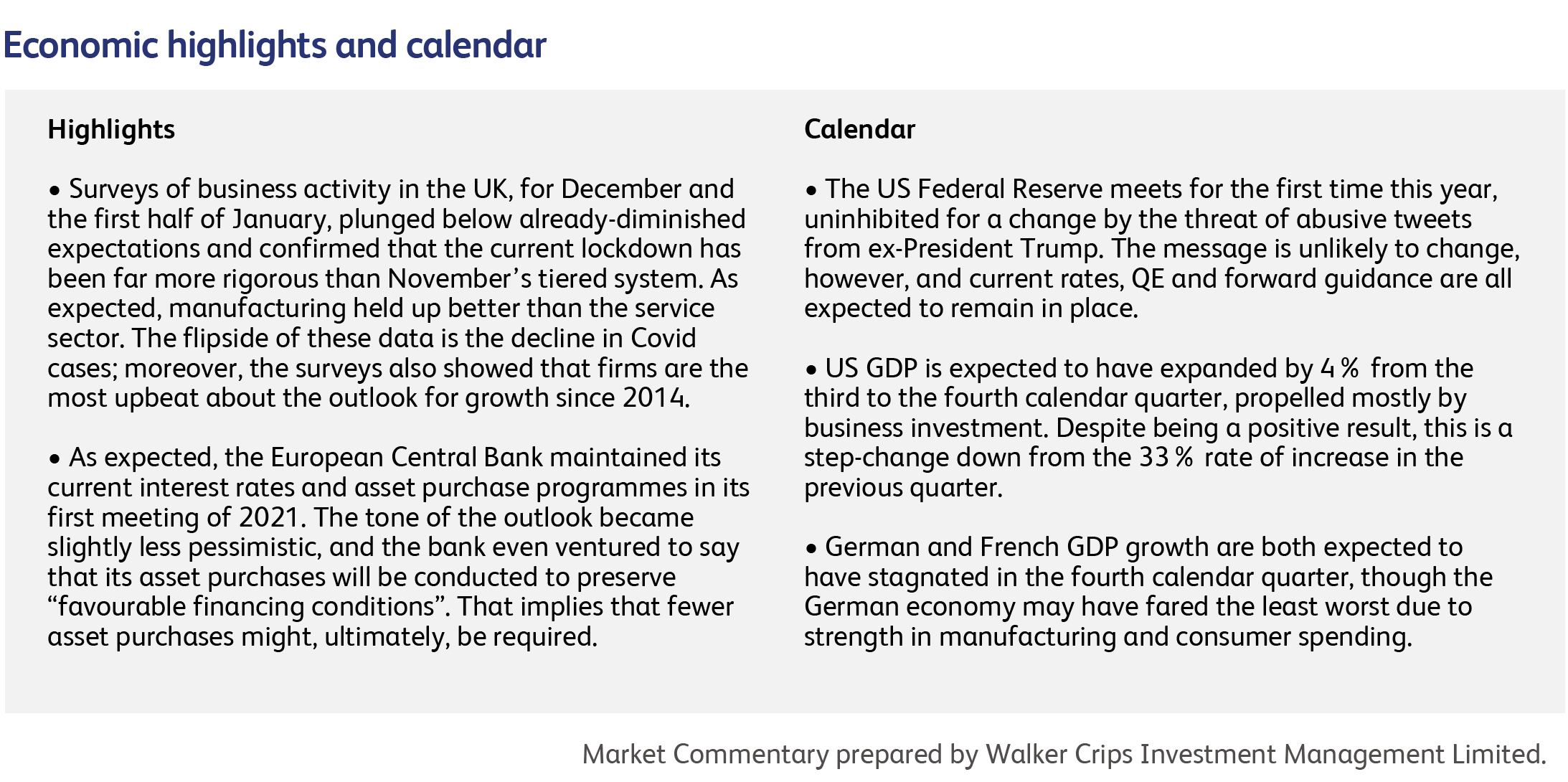
26 January 2021
What will the return to normal life look like, economically? Plenty of evidence exists that the majority of consumers have been forced into saving during the pandemic, and are looking forward to celebrating its demise with a spending spree. Most likely they will want to spend on the things they have been missing: holidays, restaurants, in-person entertainment and other leisure experiences… in a word, services. Unlike manufacturing businesses, where production can usually be adjusted to cope with changes in demand, the service sector mainly depends on the availability, and cost, of people. The more that people are in demand, the more they can charge.
That is partly why economists are increasingly forecasting a spike in inflation towards the end of the spring, once vaccines have been widely distributed. Given that the docility of inflation has been a critical component of central bankers’ ability to keep governments, economies and capital markets awash with money, does this threaten their control over interest rates and the benign environment for investors? On the one hand, the consensus among economists is that any inflation will be, merely, a temporary feature of normalisation. Most economies will then slip back into their decade-long pattern of sluggish growth; inflationary pressures will subside, central bankers will be able to keep rates “lower for longer”, governments can continue to spend without consequences and companies will be free to use their newly-acquired debts to start repurchasing their own shares again.
On the other hand, these are extraordinary times. Economic data has never been so volatile, and many of the standard measures of economic demand have been rendered useless. An example of this can be found in measures of the average worker’s earnings: these have been rising rapidly, but only because the pandemic has subtracted lower-paid jobs from the equation. Moreover, government stimulus has been so huge that economic distortions are almost certain to have occurred. We saw this in America, for example, where the stimulus packages were so generous that average incomes actually rose across the country as a whole, despite the loss of 25 million jobs. It’s quite possible that central bankers have less economic visibility at a time when, more than ever before, the entire recovery is dependent on recent economic and monetary trends continuing to behave themselves. Moreover, inflation in the service sector has never actually been docile. Nearly all the moderation in inflation over the past two decades has come in manufactured goods, as the developed world outsourced its manufacturing to the lower cost, emerging world. Meanwhile, inflation never slowed in services, such as education and healthcare.
A more direct concern for investors is that some of the enforced savings have already found their way into capital markets, pushing up prices. That price inflation has reduced the value of holding financial assets compared with the profits (or cash) they are capable of generating. A rebalancing could occur if temporary savers choose to return that money to the real economy, driving the prices of financial assets down but also boosting corporate revenues and profits and, ultimately, bringing valuations back into line with historical norms.

US video game retailer (of the bricks-and-mortar kind) Gamestop surged as much as 145% last Monday, then sank all the way back to below its previous day’s close before rallying to end the day up a mere 18%. Gamestop, which is up 300% this year already, is a symbol of the latter stages of the post-pandemic rally, having been fuelled by US retail investors on social media encouraging each other to pile into options on the company’s shares. Excessive volatility caused the New York Stock Exchange to halt trading nine times during the day.
HSBC Holdings’ Chief Executive Officer is set to appear today before the UK Parliament Foreign Affairs Committee, apparently to answer questions over the lender’s moves to freeze accounts of activists in Hong Kong. HSBC is in a difficult position, seeking growth in Asia but finding itself increasingly exposed politically as a result of compliance with Chinese regulations.
Chinese internet giant Alibaba Group’s founder, Jack Ma, appeared for less than a minute in a live-streamed video conference, and said nothing about the Chinese government clampdown that had left his business empire in crisis, but it was enough to trigger a rally in Alibaba’s share price that added $58 billion to the company’s valuation. These were Ma’s first public comments since disappearing from view late last year.
US pharmaceutical and biotechnology company Moderna Inc. have announced their Covid-19 vaccine appeared to protect against the emerging variants in laboratory tests. The news does require caution, however, as the research paper hasn't yet gone through the standard peer-review process.

This publication is intended to be Walker Crips Investment Management’s own commentary on markets. It is not investment research and should not be construed as an offer or solicitation to buy, sell or trade in any of the investments, sectors or asset classes mentioned. The value of any investment and the income arising from it is not guaranteed and can fall as well as rise, so that you may not get back the amount you originally invested. Past performance is not a reliable indicator of future results. Movements in exchange rates can have an adverse effect on the value, price or income of any non-sterling denominated investment. Nothing in this document constitutes advice to undertake a transaction, and if you require professional advice you should contact your financial adviser or your usual contact at Walker Crips. Walker Crips Investment Management Limited is authorised and regulated by the Financial Conduct Authority and is a member of the London Stock Exchange. Registered office: Old Change House, 128 Queen Victoria Street, London, EC4V 4BJ. Registered in England number 4774117.
Important Note
No news or research content is a recommendation to deal. It is important to remember that the value of investments and the income from them can go down as well as up, so you could get back less than you invest. If you have any doubts about the suitability of any investment for your circumstances, you should contact your financial advisor.